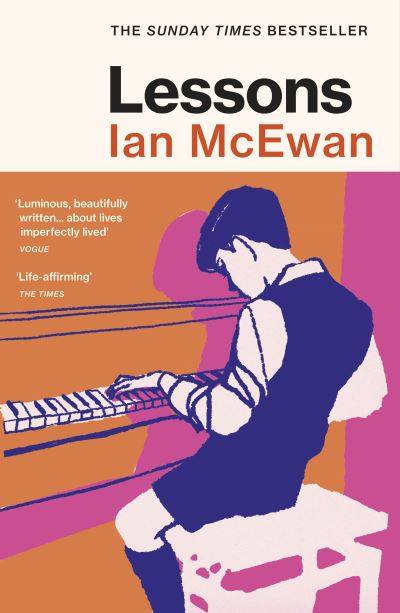LoveReading Says
Against landscapes of social and political upheavals through the 20th-century to the present day, Ian McEwan’s Lessons explores how the past impacts and directs our presents and futures through the lens of a man’s complex, exhaustively detailed life.
Perhaps reflecting the protagonist’s rootless, stifled character, there’s something detached about the writing even as the author recounts intimate and emotional events, making Lessons an introspective novel that reflects on life’s “if onlys” and “what ifs” - all those missed opportunities, and passively taken paths.
At boarding school, fresh from his military family moving to England from Libya in 1959, Roland Baines is abused by his piano teacher, a relationship that marks him through his teenage years and beyond. Indeed, this relationship dictates how Roland connects with women throughout his life. We meet him again in 1986, when his wife has vanished, leaving him with their baby son as the Chernobyl disaster strikes. Some three years later, she still hasn’t returned.
In the meantime, we’re presented with exhaustive detail on his wife’s family history and their relationship history, as played out in a swiftly changing world that extends to the future (9/11, Brexit and COVID) as well as the past (the anti-Nazi White Rose movement, Suez Crisis, and Cuban Missile Crisis, through to the Cold War and fall of the Berlin Wall).
Shining a scrutinising light on the author’s post-war generation, Lessons paints a detailed and often melancholic portrait of a man’s “drift through an unchosen life”, perhaps issuing the lesson that personal inaction and indecision cannot be blamed on external factors.
Joanne Owen
Find This Book In
Lessons Synopsis
The story of a life. The story of the year.
'Lessons shows [McEwan] at the very peak of his powers. He has written his masterpiece' Daily Telegraph
When the world is still counting the cost of the Second World War and the Iron Curtain has descended, young Roland Baines's life is turned upside down. Stranded at boarding school, his vulnerability attracts his piano teacher, Miriam Cornell, leaving scars as well as a memory of love that will never fade.
Twenty-five years later Roland's wife mysteriously vanishes, and he is left alone with their baby son. Her disappearance sparks of journey of discovery that will continue for decades, as Roland confronts the reality of his rootless existence and attempts to embrace the uncertainty - and freedom - of his future.
'Ian McEwan is a masterful storyteller' Elif Shafak
'A beautiful book about love, loss and regret' Observer
'Luminous, beautifully written... about lives imperfectly lived' Vogue
'A whole, unruly life between the covers of a single book: a literary feat' Spectator
'A tour de force... A single life is silhouetted against global happenings' Sunday Times
* A Book of the Year for The Times, Sunday Times, Financial Times, Spectator, New Statesman, Washington Post, Vogue and New Yorker *
About This Edition
| ISBN: |
9781529116328 |
| Publication date: |
22nd June 2023 |
| Author: |
Ian McEwan |
| Publisher: |
Vintage an imprint of Random House |
| Format: |
Paperback |
| Pagination: |
496 pages |
| Primary Genre |
General Fiction
|
| Other Genres: |
|
| Recommendations: |
|
Ian McEwan Press Reviews
'The supreme novelist of his generation' Sunday Times
'McEwan is one of the most accomplished craftsmen of plot and prose' New York Times
'A true master' Daily Telegraph
About Ian McEwan
Ian McEwan is a critically acclaimed author of short stories and novels for adults, as well as The Daydreamer, a children's novel illustrated by Anthony Browne. His first published work, a collection of short stories, First Love, Last Rites, won the Somerset Maugham Award. His novels include The Child in Time, which won the 1987 Whitbread Novel of the Year Award, The Cement Garden, Enduring Love, Amsterdam, which won the 1998 Booker Prize, Atonement and Saturday.
More About Ian McEwan
